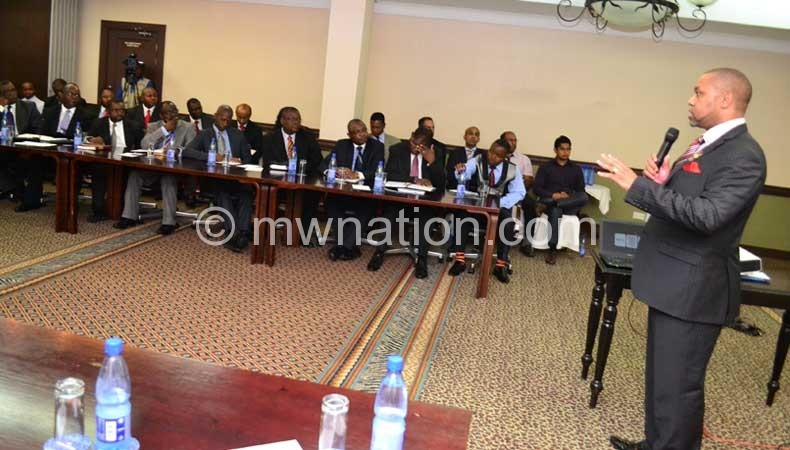Public Service reforms face first test
The proposed changes to how government does business yesterday faced a litmus test when the Public Service Reform Commission subjected them to private sector scrutiny in Blantyre.
In a bold move, the commission’s chairperson, Vice-President Saulos Chilima, spent about 45 minutes making a power-point presentation of the proposed reforms to industry captains, after which he opened up the plan to criticisms, praises and input on how to improve the suggested changes.

While businesses are comfortable with the proposed changes in general, they expressed reservations at some suggestions such as salary harmonisation and tying senior public officers to presidential tenures.
Making its comments in Blantyre on the commission’s recommendation to harmonise public service remuneration, the private sector—led by its umbrella body, the Malawi Confederation of Chambers of Commerce and Industry (MCCCI)—said salary equalisation defeats the fact that different professions require different capabilities.
“We believe that different public service commissions were set up for a purpose. Different activities generate different levels of economic value. Harmonising salaries is not the best way.
“For instance, High Court judges need to be paid differently because they take a different risk from somebody of the same education level working in the mainstream civil service,” said Chancellor Kaferapanjira, MCCCI chief executive officer.
Kaferapanjira also expressed misgivings on the recommendation that some public positions should follow the presidential tenure of office, arguing it legitimises political interference in discharge of duties.
Some of the positions include: the Attorney General, the Governor of the Reserve Bank of Malawi, the Chief Secretary to Government, the Director General of Malawi Broadcasting Corporation (MBC), the Inspector General of Police, the Commander of the Malawi Defence Force (MDF), the secretary to the Treasury, the budget director, the director-general of the Anti- Corruption Bureau (ACB) and the commissioner-general of the Malawi Revenue Authority (MRA).
Said Kaferapanjira: “We feel it is important to leave these positions to be independent and not aligned to a term of a political leader. That is basically legitimising political influence. For instance, the Inspector General of Police is a professional and he/she should be able to serve the new leader with professionalism.”
However, MCCCI lauded some reforms which, among others, include re-launching of the Vision 2020, intensification of the national identity cards programme and reduction of ministries and principal secretaries.
Kaferapanjira also called on government to speed up implementation of the reforms.
Speaking before Kaferapanjira, Chilima stressed that since independence, there have been 79 attempts to reform, but with little to show.
Admitting that lack of political will has been the major factor for the reforms’ failure in the past, the Vice-President assured that with the current Peter Mutharika administration, there is an “overflow of political will” to make needed changes.
“Not changing is not an option. There is clear indication that people want change in the public service. For example, we are receiving radical feedback from people out there…like some wanting to have only 18 principal secretaries not the 40 we are proposing because we have 18 ministries. This tells us that people out there want change and this is encouraging,” said Chilima.
He added: “The business of government is not to do business. We want you to come in and own the reforms, especially those that are easing the way of doing business. We should not make these reforms a DPP thing, but a collective effort with you the private sector being part of it.”
Among other issues, Chilima spoke of the National Identity Scheme, which the private sector welcomed, saying it will help the financial sector in identifying customers as well as tracing back those who access loans.
He also shared with the private sector the Long Term National Development Plan that will specify the national development agenda so that political changes in administrations should not affect continuity.
Chilima arrived at the venue 10 minutes before the scheduled start of the function at 8:30am and found nobody from the private sector in the meeting room, prompting Kaferapanjira to begin his speech by apologising to the Vice-President.






So Chancellor Kaferapanjira and MCCCI are basically saying to hell with the mainstream civil service.
Am begining to like this Chilima dude, he seem s to have substance